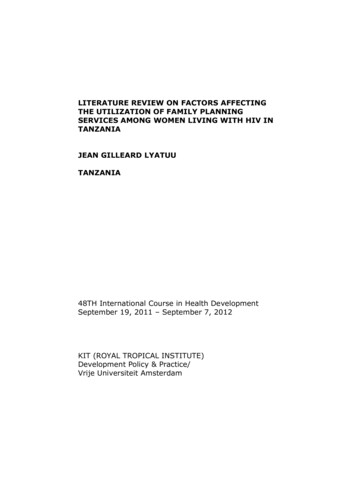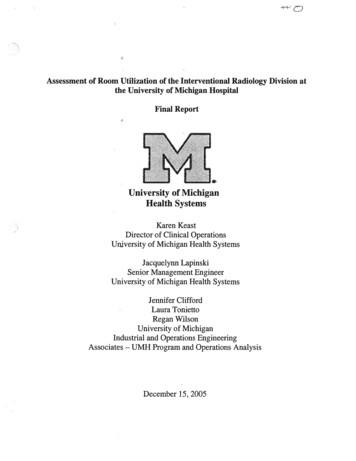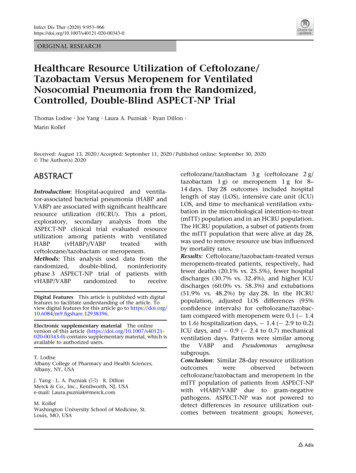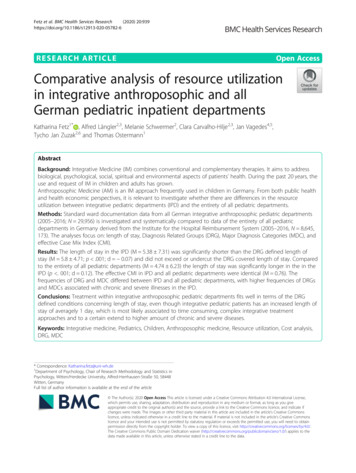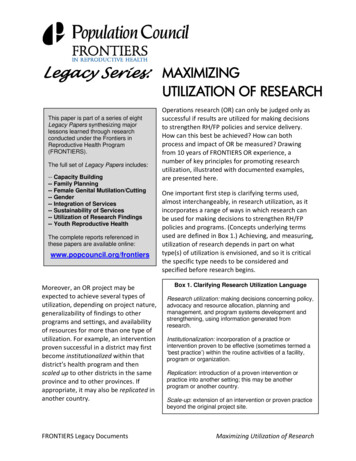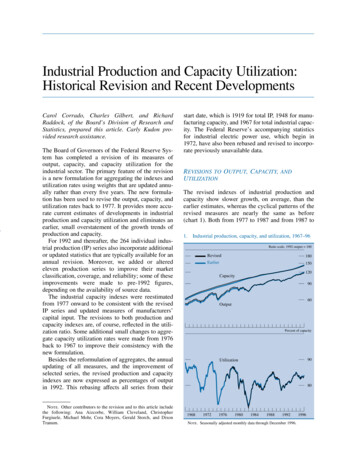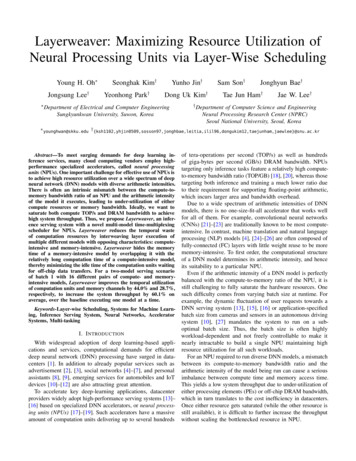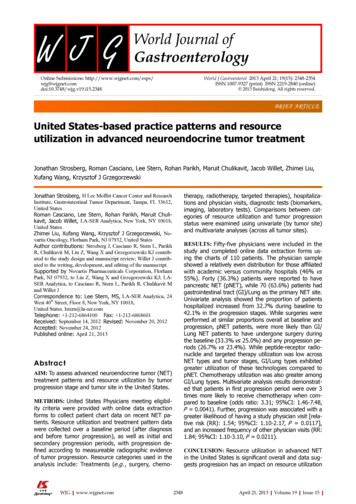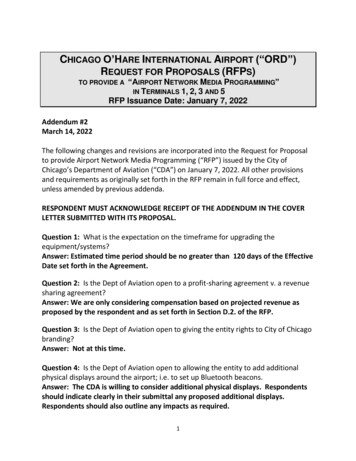
Transcription
Journal of Information ManagementISSN: 2348-1765 (Print), ISSN: 2348-1773 (Online)Volume 3, Issue 1 (January-June, 2016), pp. 59-70 Society for Promotion of Library Professionals (SPLP)http:// www.splpjim.orgCHALLENGES TO UTILIZATION OF ONLINE ARABIC INFORMATIONRESOURCES BY THE ACADEMICS IN AHMADU BELLO UNIVERSITY ZARIA ANDBAYERO UNIVERSITY KANOHamza Ukashatu MusaNCE, BLIS, MLIS (ABU) CLN,(PhD student at Career Point University Kota, Rajasthan, India)Office address: ICT Division, Kashim Ibrahim Library, Ahmadu Bello University, Zariahamzaukashat@gmail.com 917426814990ABSTRACTThis study was set out to investigate the challenges to the utilization Online Arabic InformationResources by Academics in the Ahmadu Bello University, Zaria and Bayero University Kano. Inorder to achieve this objective, 4 research questions were formulated and one hypothesis weretested at 0.05. A survey method was employed in the conduct of this study. The entire populationwas used for this study, which was made up of all the academics teaching Arabic and IslamicStudies in ABU Zaria and BUK. A well-structure questionnaire was administered to 126 ofAcademics in both ABU Zaria and BUK with a total of 79 (62.7%) copies returned. The datacollected for the study were presented and analyzed using both descriptive statistics andinferential statistics. Frequency distribution tables, simple percentages were also used for thedescriptive statistics while One Way Analysis of Variance (ANOVA) were used to test thehypothesis formulated and determine the areas of differences among the Academics teachingArabic and Islamic Studies in both Universities.It was discovered that, Slow Internetconnectivity in the institution, Erratic power supply, insufficient computer skill and lack ofinformation literacy skill were the major challenges in the utilization of online Arabic informationresources by the Academics in Ahmadu Bello University Zaria and Bayero University Kanorespectively. The study recommended that the university library should Provides internetconnectivity to each lecturer’s office, stable power supply especially in Bayero University Kano,
Hamza Ukashatu Musaso as to enable the academics to make optimum utilization of online Arabic Information resourcesat the comfort of their officesKeywords: Online Arabic; Information Resources; Utilization, challenges, Academics; ABUZaria: BUK1. INTRODUCTIONInformation is seen as a basic ingredient for personal, social and national development. It’s a vitalto the overall academic development of university’s teaching staff. Thus, it has to be stored andtransmitted in both print and electronic devices for access by its customers.The advancement in Information and Communication Technology (ICT) introduced newdimensions in the generation, acquisition, organization, processing and dissemination ofinformation in virtual environment. The ICTs help information users to search, access anduseinformation regardless of time, distance, location, size and language. The ICTs bring informationat the fingertips of information seekers. Libraries use information technology for better servicesand satisfy diverse user needs (Kattimani and Kamble, 2007). Libraries have transformed intodigital and virtual libraries where physical books, journals and magazines, newspapers, theses anddissertations have changed into e-books, e-journals, e-newspapers, e-magazines e-thesis, edissertations etc. Online information resources are easily accessed in remote areas. Onlineinformation resources solve storage problems and control the flood of information where printsources are being digitised because of the value of information in the life of human endeavor(Swain and Ray, 2009).2. ARABIC INFORMATION RESOURCESArabic Information Resources refer to information sources or resources written in Arabic onvarious subjects. They are resources that are usually found in Arabic division of the differentlibraries and information centers. The resources can be in print, non-print and electronic media.They are usually consulted by customers with Arabic language background.On the other hand, Arabic information resources could be said to consist of documents and othernon-book resources in Arabic and English languages provided to satisfy the information needs ofusers with Arabic language background (Hafez, 2006). Such resources include books of Grammar(Nahwul-wadhihi), Philosophy (Mundhiq) books of Rhetoric (Balagah), Morphology (Sarf) booksof literature (Adab), philology (Fiqhul-luggah) Arudiy, Arabic Dictionaries (Qamus) andencyclopedias (Mausuah), Arabic magazines (Mujallah) and newspapers (Jaridah) Book ofSentences analysis (Al’ierab) in print and electronic formats. They may include print journals,Challenges to utilization of online 60
Hamza Ukashatu Musamagazines, newspapers, print book, Radio and Television broadcasting. The non prints or Internetbased formats include. e-journals, e-books, e-thesies, e-newspapers,(HTML or Acrobat pdf),streaming videos, podcasting etc. Some of the Internet based resource may be accessedautomatically via a University’s IP address or using a given password to restrict access. Thepurpose of the information resources is to provide knowledge, fact, ideas and opinion on varietyof subjects to the users.3. ONLINE ARABIC INFORMATION RESOURCESOnline information resources are generally in the form of online books, online journals, onlinemagazines, online newspapers, and Internet based resources, e-mail publishing, wirelesspublishing, and web publishing etc. These are available either through Open Access internationaldonors or commercial vendor’s Examples are: Escohost, Hinari, DOAJ, Science direct andSAGE. The online information resources have become a major element of University librariescollections worldwide.The online Arabic information resources are Arabic sources or resource within Arabic languageaccessed through Internet, Intranet and network. The online Arabic information resources includeonline books, online-journals, (HTML or Acrobat PDF), streaming videos, podcasting, etc. Someof the Internet resources are accessible automatically via a University’s IP address or by usingrestricted password for adequate utilization.Online Arabic information resources, like other online resources, are needed to support therelevant university staffs academic work such as teaching, learning, research and selfdevelopment.4. STATEMENT OF THE PROBLEMAcademics are those who are actively involved in teaching learning and research activities. Theyare involved in teaching, researching, administrating and community development. Academics inany society are seen as the propellers of knowledge because they provide an effective learningenvironment. They need information resources especially online information resources to supportand promote their daily activities. Information is stored, shared, accessed and used properly tosupport education society. Online information resources have brought about a shift in theprovision of library services and information by providing wide access to resources from differentparts of the world with ease. Online information resources provide many advantages over printresources such as providing 24x7 access, universal access; saving physical space; ability to linkedChallenges to utilization of online 61
Hamza Ukashatu Musafrom and indexing and abstracting databases; accessibility from the users home, office, ordormitory irrespective of whether or not the physical library is open; the ability to get usagestatistics that are not available for print resources and their relative ease of maintenance. Onlineinformation resources have become an integral and substantial component of academic librarycollections worldwide. The resources are regarded as essential for teaching, learning and researchactivities as well as self and community development (Blecic, Kumar and nand Zhang 2011).Supporting teaching, research and learning activities traditionally becomes a major mission ofacademic libraries. University library that is to provide access to online information resources inorder to enhance information resources utilisation among its customers. However, preliminaryobservations revealed that most of the citations of the Academics teaching Arabic and IslamicStudies in writing books, journal articles and conference papers indicate no element of onlineArabic citations and no single research was conducted on online Arabic Information Resources.Hence the need of the research on challenges to utilization of online Arabic information resourcesby the Academics in Ahmadu Bello University, Zaria and Bayero University Kano.5. RESEARCH QUESTIONSThe following are the research question the study seeks to answer. What types of online Arabic information resources available for use by Academics inABU Zaria and BUK? How do the academics access and utilise the online Arabic information resources availablein ABU Zaria and BUK? For what purpose do the academics in Ahmadu Bello University, Zaria and BayeroUniversity Kano utilised online Arabic information resources? What are the challenges to utilisation of online Arabic information resources by theacademics in Ahmadu Bello University, Zaria and Bayero University, Kano?6. HYPOTHESESThe research sought to answer the following null hypotheses:Ho1. There is no significant difference between the types of online Arabic information resourcesavailable in Ahmadu Bello University, Zaria and Bayero University Kano7. OBJECTIVES OF THE STUDYThe objectives of this study are as follows: To outline the types of online Arabic information resources available for use byChallenges to utilization of online 62
Hamza Ukashatu MusaAcademics in ABU Zaria and BUK To investigate how do the academics utilise the online Arabic information resourcesavailable in ABU Zaria and BUK To outline the purpose do the academics in Ahmadu Bello University, Zaria and BayeroUniversity Kano utilised online Arabic information resources? To examine the challenges in the utilisation of online Arabic information resources by theacademics in Ahmadu Bello University, Zaria and Bayero University, Kano8. METHODOLOGYA survey method was employed in the conduct of this study. The total number of 126 (62.7%)Academics teaching Arabic and Islamic Studies in Ahmadu Bello University, Zaria and BayeroUniversity Kano (Arabic Faculty of Art, ABU Zaria, Art and Social Science Education, ABUZaria, Institute of Education ABU Zaria, Arabic and Islamic Education, ABU Zaria, Centre forIslamic and Legal Studies ABU Zaria, Arabic Department, BUK, Sharia and Islamic studies,BUK were used for this study. The instrument used for data collection was questionnaire; the datacollected for the study were presented and analyzed using both descriptive statistics andinferential statistics. Frequency distribution tables, simple percentages were used for thedescriptive statistics while One Way Analysis of Variance (ANOVA) were used to test thehypothesis formulated and determine the areas of differences among the Academics teachingArabic and Islamic Studies in both Universities.9. RESULTSTypes of Available Online Arabic Information Resources being Aware of by the Academics inAhmadu Bello University Zaria and Bayero University Kano Types of the Online ArabicInformation Resources used by the Academics in Ahmadu Bello University Zaria andBayero University KanoTable below, it was discovered that Brill Online (Journal of Arabic Literature), JAIS OnlineDatabase (DOAJ) and Arabica Online,Waqafeeya, Arabwq online and Alslam-L online were thetypes of online Arabic information resources used by Academics with highest frequency of over50% responses scores by the academics in Ahmadu Bello University, Zaria and BayeroUniversity, Kano respectively, Whereas Al-badr online and Arabwq, Arab e-Marafa (Ebscohost)and The Arabic Paryrology database (Sage OARE)were the types of online Arabic informationresources used with least frequency of less than 6.4% responses scores respectively.Challenges to utilization of online 63
Hamza Ukashatu MusaHowever, a further observation from the table indicated that Online Journals of Islamic StudiesReligion, Online Islamhouse, Ajurry online, Al-badr online, Ayna.com, Ahlaldeeth online andJAIS online database (DOAJ) were completely not used by the Academic in BUK. This perhapsmight be connected to the fact that majority of the Academics teaching Arabic and IslamicStudies may not consider online resources as sources of information for their academic activities.It was also observed that over 61% of the respondent in both ABU Zaria and BUK were not usedthe available of online Arabic information resources on University Library’s websites. Thisfinding is corroborated by that Talhami, (2009) found that only 18% of academics at the KingFaisal Abdulaziz University Library of JIM agreed to make used of Electronic Arabic database,while about 80% knew little about the resources.Types of Online Arabic Information ResourcesUniversitiesABU ZariaBU KanoAhlaldeeth onlineF13%27.7F0%0.0AIslam-L onlineAjurry online121025.521.313040.60.0Al-badr online48.500.0Arab e-Marafa (Ebscohost)Arabic Paryrology database (Sage OARE)438.56.45415.612.5Arabwq online1225.51443.8Arabica online2451.1412.5Askzad .0Brill online (Journal of Arabic Literature)2961.7618.6EALL Online1736.2515.6Islamay Online817.0412.5JAIS Online databases (DOAJ)2451.100.0Online islamhouse919.100.0Online Journals of Islamic Studies 17.026.3Challenges to utilization of online 64
Hamza Ukashatu MusaWaqfeya online1021.31237.5How do the academics access the online Arabic information resources available in theAhmadu Bello University, Zaria and Bayero University, KanoHow do the academics access the online Arabic Universitiesinformation resources availableABU ZariaBU KanoF%F%By direct reading from Net4697.932100By downloading the information resources3880.932100By mere cut and paste817.0618.8By saving the document in any storage devices1838.3618.8By printing the content of the document3370.21959.4Downloading forwarded document from an email612.81031.3The table above revealed that Academics Arabic and Islamic studies at ABU Zaria and BUKaccess the online Arabic information resources through direct reading from the net, downloadingthe information resource and printing the content of the document with the highest frequency ofover 70% and 100% responses scores respectively.On the other hand, the use of cut and paste, saving the document in the storage devises werefound to be the least means of access and use of online Arabic information resources withfrequency of less than 20% responses scores. However, from the result, it shows that majority ofthe respondents prepare reading from the net and downloading the information resource thenprinting the content of the document.Means of Accessing Online Arabic Information Resources by the Academics of ABU andBUKMeans of Accessing Online Arabic Information Resources UNIVERSITIESby the Academics of ABU and BUKABU Zaria BU KanoF%F%Internet (Cable and Wiresless)42 89.400.0GSM Network18 38.325 78.1Internet Café11 23.417 53.1Modem32 68.125 78.1Through library website10 21.300.0Search engines28 59.631 96.9A list of options was provided for the respondents to indicate as many relevant options as possibleas shown in the table below.Means of Accessing Online Arabic Information Resources by the Academics of ABU and BUKChallenges to utilization of online 65
Hamza Ukashatu MusaThe above table revealed that Internet (Cable and Wires) were the means of accessing onlineArabic information resources with highest frequency of 80% responses score by the Academics inABU Zaria due to availability of internet connectivity in the institution. Whereas internet Caféwere also another means of accessing online Arabic information resources with the leastfrequency of less than 23% responses respectively. However at BUK, that GSM Network andpersonal Modem were the means of accessing online Arabic information resources resource withthe highest frequency of Over 70% responses scores by the Academics due to lack of Internetconnectivity in the offices and poor ICT finicalities. The study went further to discovered thatOver 60% and 90% of the respondents in ABU and BUK access online Arabic informationresources through GOOGLE and other search engine instead to search through available onlinelibrary databases. This finding is supported by earlier finding of Madhusudhan (2007) reveals thatmost research scholars at Delhi University, used search engines more than subject gateways orWeb directories to locate information. This finding is not agreed by Abdul Mannan Khan (2009)noted that a majority of research scholars and Faculty members of JMI and JNU Universities wereable to access online database through central universities library website. This shows that there isneed for both Universities library to organize more training to their academics especially thoseteaching Arabic and Islamic on the use of online database available.Purposes to Utilization of Online Arabic Information Resource by the Academics in ABU Zariaand BUKThe table revealed the response of the respondents on the reasons/purpose for utilization onlineArabic information resources that research activities , thesis writing, lecture note, teaching,preparing writing for publication were the major reasons for the use of online Arabic informationresources by the Academics in ABU Zaria and BUK. This finding corroborates the finding ofTalhami, (2009) reports Arabic database are used for research purposes, about one-quarter to onethird used it to prepare lectures and gain subject knowledge.Challenges to utilization of online 66
Hamza Ukashatu MusaPurpose of access and use of online ArabicInformation Resources by the respondents ofABU Zaria and BUKUniversitiesABU ZariaF%BU KanoF%Research activities4085.132100Paper writing for /workshop onsultancy service1634.026.3Community development510.6618.8Lecture Note3268.12475.0Thesis/ Dissertation writing3778.72578.1Challenges to Utilization of Online Arabic Information Resources by the Academic of ABUZaria and BUKChallenges faced by the respondents of ABU and BUK inaccessing the online Arabic information resourcesavailable.UniversitiesABU ZariaBU KanoF%F%3370.2 2475.0Not computer literate4697.9 3196.9Slow Internet connectivity in the institution4697.9 2990.6Erratic power supply3983.0 32100Poor ICT facilities3778.7 3093.8Lack of access to Internet connectivity in the office3268.1 3196.9Insufficient access to needed journalsFrom Table Shown that slow Internet connectivity in the institution, Erratic power supply,insufficient computer skill and lack of information literacy skill were the major challenges in theutilization of online Arabic information resources with highest frequency of over 85% responsesscores by the Academics in Ahmadu Bello University Zaria and Bayero University KanoChallenges to utilization of online 67
Hamza Ukashatu Musarespectively. Whereas, poor ICT facilities and lack of Internet connectivity in the office were themajor challenges in the utilization of online Arabic information resources with highest frequencyof 95% and 100% responses scores by the Academics at Bayero University Kano. The prevalenceof these challenges was also reported in similar studies such as Abdullahi and Haruna (2008) whofound out that lack of basic knowledge of ICT is the second major constraint after the problem oferratic power supply to the use of electronic resources in the university libraries in Nigeria. Theresult falls in line with Hafeez (2010) identified various problems the users face while usingArabic electronic resources. Slow internet connectivity, Poor ICTs facilities, lack of access to lowcost printers in the library, using advanced search strategy of most databases, and lack ofawareness of most of the e resources are significant contributors for the low patronage ofcustomerHYPOTHESIS ONEAnalysis of variance on the types of available online Arabic information resources in AhmaduBello University, Zaria and Bayero University KanoGroup StatisticsCOLLEGE NMeanStd. Deviation Std. Error DF t-valueABUZARIA474.8085 3.24130.47279BUKKANO322.8125 1.28107.22646773.307P.001DecisionsSignificantTable shows the analysis of variance on the type of available online Arabic information resourcesin Ahmadu Bello University, Zaria and Bayero University Kano at (P 0.05) level of significance.From the table, the observed T- value of 3.307 is greater than the P critical value of .001 at thesame degree of freedom. This implies that the null hypothesis is rejected. It can therefore beconcluded that there is a difference between the types of online Arabic information resourcesavailable in Ahmadu Bello University, Zaria and Bayero University Kano10. SUMMARY OF MAJOR FINDINGSBased on the data collected and analyzed for this study, the following are the major findings:Brill Online (Journal of Arabic Literature), JAIS Online Database (DOAJ) and ArabicaOnline,Waqafeeya, Arabwq online and Alslam-L online were the types of online ArabicChallenges to utilization of online 68
Hamza Ukashatu Musainformation resources used by Academics by the academics in Ahmadu Bello University, Zariaand Bayero University, Kano respectively,that Academics Arabic and Islamic studies at ABU Zaria and BUK utilised the online Arabicinformation resources through direct reading from the net, downloading the information resourceand printing the contentInternet (Cable and Wires) were the means of accessing online Arabic information resources bythe Academics in ABU Zaria due to availability of internet connectivity in the institutionthat research activities , thesis writing, lecture note, teaching, preparing writing for publicationwere the major reasons for the use of online Arabic information resources by the Academics inABU Zaria and BUK.Slow Internet connectivity in the institution, Erratic power supply, insufficient computer skill andlack of information literacy skill were the major challenges in the utilization of online Arabicinformation resources by the Academics in Ahmadu Bello University Zaria and BayeroUniversity Kano respectively.There is no significant difference between the types of online Arabic information resourcesavailable in Ahmadu Bello University, Zaria and Bayero University Kano.11. CONCLUSIONBased on the findings of the study, it could be concluded that Slow Internet connectivity in theinstitution, Erratic power supply, insufficient computer skill and lack of information literacy skillwere the major challenges in the utilization of online Arabic information resources by theAcademics in Ahmadu Bello University Zaria and Bayero University Kano respectively, this ledto under- utilization of the resources. Therefore, the study recommended that the universitylibrary should Provides internet connectivity to each lecturer’s office, stable power supplyespecially in Bayero University Kano, so as to enable the academics to make optimum utilizationof online Arabic Information resources at the comfort of their offices.REFERENCESAbdullahi, A &Harun S.A. (2008). use of e-resources among postgraduate student at the IslamicUniversity in Riyadh, Saudi Arabia. Journals of Academic librarianship, 23(1), 69-75.Hafeez. B, A. (2006), availability and use of Arabic databases by research scholars of KingFaisal Abdul-Azeez library, Jami’atul Islam Madina, Libri, 49(1), 1-9.Challenges to utilization of online 69
Hamza Ukashatu MusaIbrahim A. E. (2006), Use and perception of online databases in Islamic private Universities,Libri, 54(1), 18-29Kattimani PS, Kamble V. T. (2007). Bannari Amman Institute of Technology. Tahil Nadu. IndianJ. Inf. Sci. Sci. Serv. 1(1), 1-2.Kinengyre A. A (2007), The effect of information literacy on the utilization of e- resources imUganda. The electronic library, 25(3), pp. 238-341.Khalid, M (2011). Utilisation of Arabic information resources in College and Islamic Universityin Riyadh, Saudi Arabia. Brill online, 1 (2), PP.15-19, Available b3a1a-sLutchumanan B, and TalhamiA. (2011). Electronic Resources Usage in Academic and Researchinstitutionsin Tanzania. Information Development, 21(4).Madhusudan, M. (2008). Use of UGCinfornet e-journal by research scholars and student ofUniversity of Delhi, Delhi. Library Hi tech, 26 (3), 369-386.Talhami, T. (2009). Awareness and use of electronic Databases by postgraduate’s student in kingFaisa Abdulazizz University. Brill online, 1(2), 15-19.Ojedokum, A.A. and Owolabi, E.O. (2003). Internet access competence and use of internet forteaching and research by University of Botswana Academic staff. African Journal oflibrary,Archive and Information Sccience, 13 (1), 43-53.Ray S, Walavalkar P. (2009). Re-inventing the corporate library: A success story of best practicesin TCS libraries. International conference proceedings. In Shaping the future of speciallibraries: Beyond Boundaries (pp. 517-523.). New Delhi: Ane books Pvt.Zhamg, Ye and Lui. (2011). Electronic databases Usage in India scenario, Libri, 21 (4).Challenges to utilization of online 70
RESOURCES BY THE ACADEMICS IN AHMADU BELLO UNIVERSITY ZARIA AND BAYERO UNIVERSITY KANO Hamza Ukashatu Musa NCE, BLIS, MLIS (ABU) CLN, (PhD student at Career Point University Kota, Rajasthan, India) Office address: ICT Division, Kashim Ibrahim Library, Ahmadu Bello University, Zaria hamzaukashat@gmail.com 917426814990
